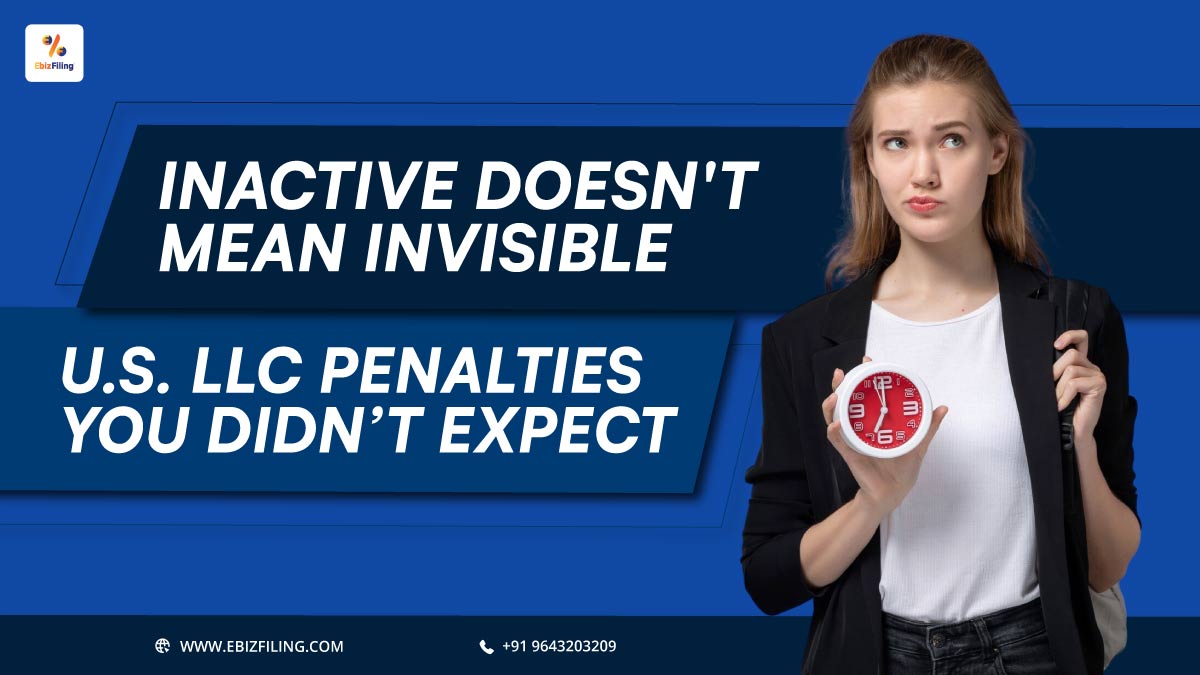
-
June 26, 2025
USA-Registered LLC Penalties Despite No Activity
Introduction
Just because your US LLC hasn’t started doing business doesn’t mean you can ignore the rules. Most states still expect you to file reports every year, pay certain fees or taxes, and keep a registered agent. If you skip these steps, your LLC could get fined, lose its legal protection, or even be closed by the state.
Summary
- Even if your LLC isn’t active, you still have to file reports and pay fees to stay within the rules.
- If you miss deadlines, you could be fined, lose your good standing, or your LLC might get closed.
- If your LLC is closed, you can often restore it by paying what you owe and submitting the right forms.
- Following these rules helps keep your business safe and protects your personal money.
- If you don’t want to keep your LLC, you can close it properly, which will stop extra fees and future issues.
What It Means
Even if your LLC hasn’t done any business, the state still treats it like a real company. So, you still need to:
- File reports every year or every two years
- Pay any required state fees or taxes
- Have a registered agent to receive official mail for your LLC
- File tax returns, even if you didn’t make any money
If you don’t follow these rules, you might have to pay late fees, lose your LLC’s good reputation with the state, or even risk being personally responsible for the business.
Why It Matters
| Risk | Description |
|---|---|
| Late fees & penalties | States charge for late filings and missed payments (can grow quickly) |
| Loss of good standing | This damages reputation and blocks contracts or loans |
| Administrative dissolution | State may shut and revoke liability protection |
| Personal liability risk | Loss of LLC protections can expose your personal assets |
| Tax consequences | Even without income, tax filings and franchise tax may apply |
Why It’s Important to Stay Compliant (Even If Your LLC Is Inactive)
- It keeps your business legally alive in the eyes of the state
- It protects you from being personally responsible for business debts
- It helps you avoid extra costs like late fees or charges to bring the LLC back
- It lets you keep your business name safe so no one else can take it
- It makes restarting the business in the future much easier and faster
Benefits of Staying Compliant
- You won’t get fined: Staying up to date helps you avoid late fees and extra charges from the state.
- Your business stays legally protected: It keeps your LLC in good standing and protects your personal assets.
- You save money later: If your LLC gets closed, bringing it back costs more than just keeping it active.
- You can restart the business easily: If you want to use the LLC later, it’s quicker and less expensive if everything is up to date.
- You keep your original start date: This helps if you ever need to show your business history or protect your brand name.
Documents You May Need to Get Your LLC Back on Track
- Annual or Biennial Report
- Reinstatement Form (if your LLC was closed)
- Statement of Information
- Tax Clearance Certificate
- Back Tax Filings
- Affidavit or Cover Letter
- Proof of Payment
Steps to Fix Penalties for an Inactive LLC
- Check Your LLC’s Status: Go to your state’s business website and look up your LLC to see if it’s active or marked as inactive or dissolved.
- Find Out What’s Missing: See what forms or payments you’ve missed, like annual reports or state fees.
- Talk to a Professional: It’s a good idea to speak with a tax expert or business lawyer who can guide you and help avoid mistakes.
- File Any Late Reports or Taxes: Complete and submit anything that was due but wasn’t filed, such as tax returns or reports.
- Pay All Fees and Penalties: Settle any outstanding amounts, including late fees or franchise taxes.
- File Reinstatement Forms (if needed): If your LLC was closed by the state, submit a form asking to bring it back to active status.
- Make Sure You Have a Registered Agent: Every LLC must have a person or service to receive official documents on its behalf.
- Decide What to Do Next: If you no longer need the LLC, officially dissolve it. If you want to keep it, stay up to date from now on.
Compliance Checklist for Inactive LLCs
- Send your yearly or every-two-years report so the state knows your business info is up to date.
- Pay any state business taxes, even if your LLC didn’t make money; some states still charge a basic fee.
- File your tax returns with the IRS, usually Form 1065 or 1120, even if you had no income.
- Keep a registered agent listed to receive important legal or government mail for your LLC.
- If you’re done with your LLC, officially close it by filing the right paperwork so you don’t keep getting charged fees or penalties.
Legal Terms
- Administrative Dissolution: This means the state has closed your LLC because you didn’t follow the rules, like missing reports or not paying fees.
- Franchise Tax: A yearly fee you pay to the state to keep your LLC active, even if you didn’t earn any money.
- Good Standing: This means your LLC is up to date with the state and hasn’t missed any filings or payments.
- Reinstatement: The process of bringing your LLC back after the state has shut it down.
- Registered Agent: A person or company who receives official mail and legal notices for your LLC. Every LLC must have one.
Conclusion
Even if your LLC isn’t doing any business or making money, you still have to follow state rules. If you don’t file reports or pay fees on time, penalties can add up fast. The best choice is to either keep everything up to date or officially close the LLC if you’re not using it. Ignoring these responsibilities can cause bigger problems and costs down the road. If you’re unsure what to do, it’s a good idea to talk to a tax or legal expert for help.
FAQs
Do I still need to file reports if my LLC has no income?
Yes. Most states want you to file yearly or every two years, even if your LLC hasn’t done any business.
What happens if I miss the deadline to file my annual report?
You might have to pay late fees, lose your good standing, and your LLC could even be closed by the state.
Does an inactive LLC still have to pay taxes?
Yes. Some states, like California, charge a minimum tax even if your LLC didn’t make any money.
What is administrative dissolution?
It means the state officially shuts down your LLC because you didn’t file reports or pay fees on time.
Can I get my LLC reinstated after it has been dissolved?
Usually yes, if you pay the overdue fees and penalties and file all the missing paperwork.
If my LLC is dissolved, can I be personally responsible for debts?
Yes. You could lose the protection your LLC gives you, which might put your personal assets at risk.
What happens if I don’t have a registered agent?
You could get fined, lose your good standing, or even have your LLC closed by the state.
Can I just let the state dissolve my LLC automatically?
Maybe, but fees and penalties can keep adding up. It’s better to officially close your LLC properly.
Does an inactive LLC have to file federal tax returns?
Yes. Even with no income, you usually need to file a zero-income return like Form 1065.
How do I officially end my responsibilities for an inactive LLC?
File the proper dissolution papers with the state and pay any outstanding taxes and fees.
Register Your Company in USA Online
Stay Safe from LLC Penalties in the USA—Trust Ebizfiling experts for smooth Compliance
About Ebizfiling -










January 29, 2026 By Steffy A
Monthly Bookkeeping Package: What It Covers and Why It Matters Let’s talk about it At Ebizfiling, we often meet founders at a familiar point. The business is growing, invoices are going out, money is coming in, but the numbers […]
January 28, 2026 By Steffy A
Business Formation Statistics by US State Introduction Business formation activity across the United States showed clear state-wise patterns in 2025, based on Census Bureau data. Last year revealed how location, policy, and economic conditions shaped new business registrations. […]
January 27, 2026 By Dhruvi D
How to Get a Merchant Account for Your Business ? To Start with, Accepting card payments is no longer optional for most businesses. Customers expect to pay using debit cards, credit cards, and online payment methods. To make that possible, […]